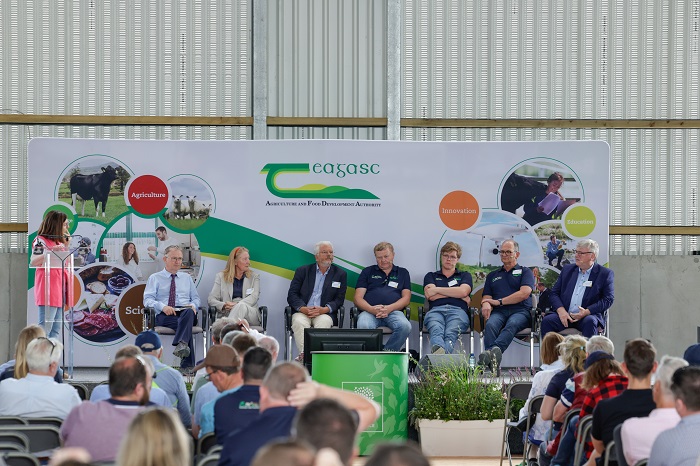29 June 2024
‘Top 3 MACC measures’ must be prioritised in beef’s emissions reduction journey
Marie Donnelly, Chair of the Climate Change Advisory Council (CCAC), joined the ‘Securing your Future in Beef Farming’ forum at the Teagasc National Beef Open Day, BEEF2024, on June 26, where she highlighted the group’s work in advising Government policy on climate.
Addressing the beef farmers and industry stakeholders in attendance, Marie Donnelly said that the group is advising government to focus on “the top three areas” of the Teagasc Marginal Abatement Cost Curve (MACC) to bring about the required reduction in greenhouse gas emissions from agriculture, but added that Government, farmers and the wider industry all have a key role to play.

Joining Maeve Dineen at the ‘Securing your future in beef farming’ forum at BEEF2024 were from left to right: Professor Frank O Mara, Director of Teagasc; Marie Donnelly, Chair of the Climate Change Advisory Council; Ciaran Fitzgerald, agri economist; Donnacha and Eamonn McCarthy, Future Beef Programme farmers; Ken Gill, Future Beef Programme farmer; and Pat McDonagh, founder of Supermac’s.
Irish Government policy necessitates a 25% reduction in greenhouse gas emissions by 2030 (5.75 Mt CO2e) for the agriculture sector. The Teagasc MACC identifies the most cost effective pathways to achieve this. From this pathway, Marie Donnelly highlighted the role of fertiliser – both quantity spread and product type, age of finish and the implementation of new technologies – such as feed and manure additives to reduce methane.
Touching on Ag Climatise, the Department of Agriculture, Food and the Marine’s roadmap towards climate neutrality, Marie Donnelly highlighted the requirement to not only reduce the volume of chemical nitrogen used by 30%, but to move away from CAN-based fertilisers to protected urea, noting that the wider industry has a role in ensuring the availability of protected urea products to farmers.
“I think there is an onus on the industry to play their part and ensure they facilitate farmers to make the right decision,” Marie Donnelly added.
Commenting further on earlier finishing, she added: “If you look at the MACC curve from Teagasc, early finishing is a big one. This is a million tonnes of emissions we are talking about and yet the beef bonus scheme does not reflect that, and it is not rocket science to change that to make it more financially useful for farmers to actually achieve that.”
Along with the above, the CACC is also advising Government on land use, particularly forestry, energy and the rewetting of peatlands, and how such initiatives can be used to bring about the required reductions while at the same time giving farmers incentives and additional diversification options.
Also joining Marie Donnelly on the forum was Professor Frank O Mara, Director of Teagasc. After congratulating Teagasc staff for delivering an excellent event, Professor O Mara said that the Irish beef industry is built on strong fundamentals, which contribute to the production of a quality product from a grass-based system.
When asked by forum chair Maeve Dineen which technology he was most excited about from a beef farming perspective, Professor O Mara said: “You can’t just pin this down to one technology. What excites me really is the potential that’s there for improved incomes and improved environmental performance on our beef farms. I think there’s a great future for the beef industry. The technologies that are on display here today are all about improving the efficiency, the profitability and environmental performance on our farms.”
For more insights from the ‘Securing your Future in Beef Farming’ forum, watch the recording below:
Learn more about the technologies on show at BEEF2024 here.
